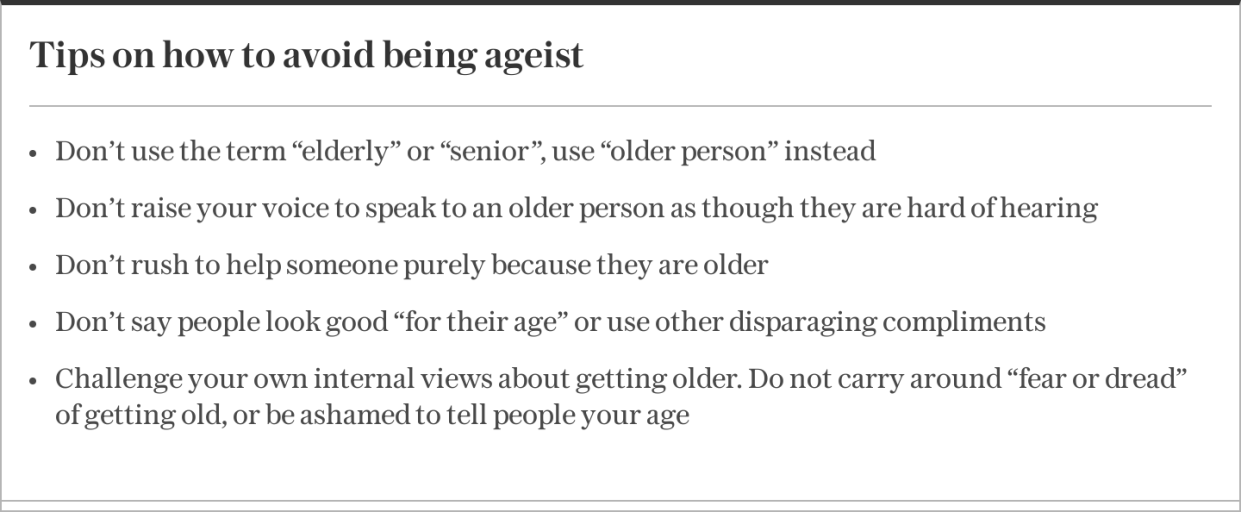New York rolls out anti-ageism in schools to tackle ‘Disney villain’ stereotypes
New York has begun rolling out anti-ageism lessons in high schools in which students are being encouraged not to refer to older people as “cute” or “elderly”.
Lorraine Cortés-Vázquez, the city’s commissioner for ageing, said she has introduced lessons on the “insidious” prejudices against the older generation to the school curriculum to fight the epidemic early on.
“America is so youth-oriented, or never-growing-old-oriented”, she added.
Ms Cortés-Vázquez hopes teaching teenagers about the real-world consequences of ageism will influence how they treat their colleagues when they enter the world of employment.
Under the scheme, 18 New York schools have been educating young people on topics such as how the word “elderly” can be offensive because of connotations of frailty and weakness.
As classrooms open again for a new school year, another cohort will be taught about the three forms of ageism: offensive, benevolent and internalised.
The former covers negative assumptions about older people, such as assuming they are slow and incompetent because of their age.
Benevolent tropes are what people “might think is flattery”, Ms Cortés-Vázquez said. These are often infantalising, such as thinking someone is “cute” or being surprised when older people show affection to one another. Other examples include saying someone “looks good for their age”.
“It’s a benevolent way of being disparaging,” she said. “It’s like, ‘Oh, how cute are they when they’re kissing’... does my sexuality end at a certain age or my desire for passion?”
There is also an issue with “internalised” ageism, Ms Cortés-Vázquez added, which is when older people have negative beliefs about ageing and what they are capable of. It is this form of ageism that impacts health outcomes so drastically, as people begin to restrict and shrink their worlds to align with what they believe is appropriate.
Ms Cortés-Vázquez said the lessons were borne out of an exercise in which interns working in her department were charged with analysing their own prejudices towards older generations and traced them back to Disney.
They recalled childhoods spent watching Disney’s villainous Cruella de Vil parading around with shock of black-and-white hair while she plotted to murder and skin puppies in 101 Dalmatians.
There was the “Old Hag” from Snow White, complete with wrinkles and warts, whom the evil queen disguises herself as to hand over the poisoned apple.
And, of course, there was Urusla from The Little Mermaid, the greedy sea witch with a paper-white pixie cut.
“They were struck by how older adults were usually portrayed as people who were scary, or were ominous, or people who were dodos, dumb, you know, slow,” said Ms Cortés-Vázquez.
The students “highlighted how demeaning they found it and how it really did cause them to have these preconceived notions of age”, she added.
“So we said, ‘you know what, we need to start tackling this in different ways’.”
The lessons are being rolled out in the context of what has been dubbed the “silver tsunami”, with people living longer and fewer couples choosing to have children.
More than one in six people were aged 65 or older in the US in 2020, according to a report from the Administration on Aging, and it is projected there will be around 80.8 million over-65s in the country in 2040.
Meanwhile, a 2022 study of 2,035 US adults aged 50 to 80 found 93 per cent had experienced everyday ageism.
Ageism is not simply unpleasant for those suffering it, it can also have drastic health implications. A 2002 study found people with a positive outlook on ageing lived on average seven-and-a-half years longer than those who had negative beliefs.

Dr Tracey Gendron, chair of the Virginia Commonwealth University Department of Gerontology, said the impact of age-based prejudice is so negative it “should be up there” with smoking.
“Don’t smoke, eat well, exercise, have a positive view of ageing,” she said.
Ageism is “literally in the air that we breathe”, she added, and the “whole underbelly of it affects your health, it affects your happiness, and it affects your wellbeing”.
Dr Gendron, said the school scheme is a “wonderful approach” to fighting ageism.
“I think we could go even earlier than that, start to think about children’s literature and movies and TV shows and how we depict older people in cartoons and all of these things, because ageism is not innate, ageism is taught, which means that we can change that, that we have the power to change that.”
Dr Gendron has also suggested we start using the term “elderhood” to talk about the stage in life after adulthood.
